Today, we will talk about Potty Training Autistic Child Practical Tips for Success. Potty training is an important milestone for both parents and children. For a mother, it’s a moment of great joy when her child becomes potty trained. However, when a child has developmental delays and manages to achieve this milestone, it brings even greater happiness to the mother.
Table of Contents
Often, parents find themselves unsure about where to start with potty training. To all the parents, take it easy—this is a skill that may take longer to develop in children with special needs. Especially for autistic children and ADHD (Attention deficit hyperactivity disorder), the process can be challenging as they might struggle to understand instructions or learn new skills quickly.
Why are Special children not able to become toilet-trained quickly?
Autistic children often face challenges with potty training due to sensory sensitivities, behavioral challenges, and difficulties in understanding and communication. They may not always grasp what we are trying to teach them, making the process slower. However, with consistent practice and the use of visual aids, they can better understand what is being communicated. Daily practice and patience can help them eventually become toilet-trained.
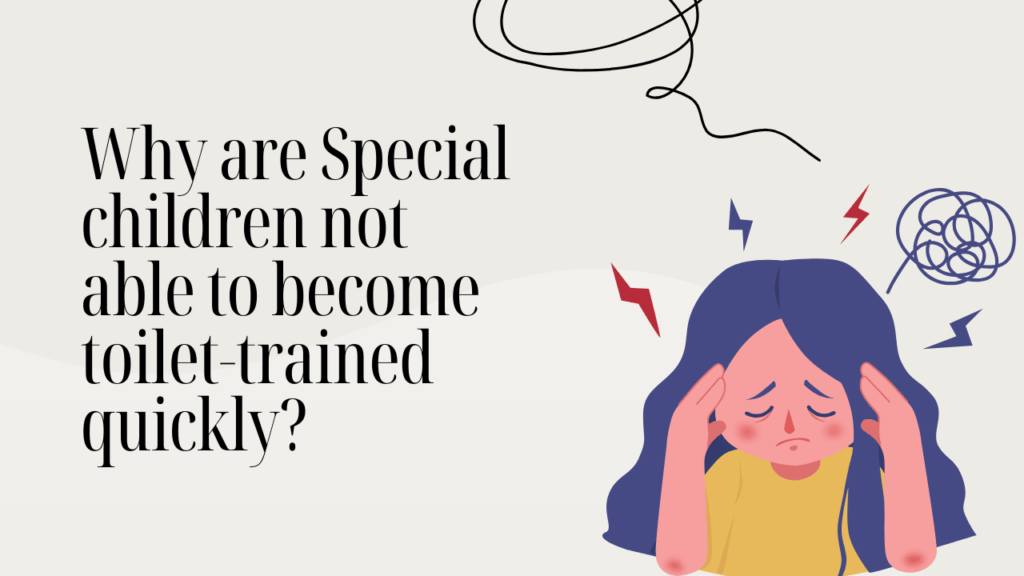
1. Sensory Issues in the Bathroom
Many autistic children struggle with sensory sensitivities that make using the bathroom difficult.
- Bright Lights: Some children dislike the intensity of bathroom lights.
- Cold Tiles: Bathroom tiles can feel uncomfortably cold to them.
- Toilet Sound: The sound of flushing can be overwhelming due to their sensitivity to noise.
2. Aversion to Toilet Seats
- Cold Surface: Many children avoid sitting on the commode or toilet seat because they feel it’s too cold.
- Fear of Depth: Some children are scared of the depth of the toilet bowl, making them reluctant to use it.
3. Reluctance to enter the bathroom
Some children don’t even want to step inside the bathroom due to sensory discomfort.
4. Confusion About Bathroom Use
- Lack of Understanding: Many children sit on the toilet but don’t understand what they’re supposed to do.
- Passing in Diapers or Openly: Instead of using the toilet, they follow their usual routine of passing stool in diapers or on the floor.
5. Standing Position Instead of Sitting
Some children may enter the toilet but still pass stool while standing, as they are not comfortable sitting on either an Indian toilet or a Western commode.
6. Forced Sitting and Its Consequences
- Parents often force their children to sit on the toilet, but this approach can backfire.
- The expected results may not be achieved, as children resist due to discomfort and sensory sensitivities.
7. Impact of Sensory Issues
- Sensory challenges significantly delay toilet training for these children.
- Addressing these issues with patience and understanding is key to successful potty training.
Tips for Potty Training Autistic Child
1. Patience and Consistency
- Be slow and patient; do not rush or pressurize the child.
- Start toilet training today if your child isn’t trained yet.
2. Bathroom Preparation
- Create a Comfortable Space: Improve the bathroom environment for your child.
- Address Smell Sensitivity: Use a light perfume spray if the child is sensitive to smells.
- Avoid Cold Toilet Seats: Pour hot water over the toilet seat, clean it with tissue, and then let the child sit.
3. Identifying Non-Verbal Cues
- Observe your child’s facial expressions to identify when they need to use the toilet.
- Respond immediately by guiding the child to the toilet seat.
4. Engaging the Child in the Bathroom
- Decorate the Bathroom: Use cartoon pictures or their favorite themes to make the bathroom engaging.
- Provide Support: Place a small table or bricks under their feet to ensure comfort and help with constipation. If you place a stool under your child’s feet, it will create a hole for his anus through which he will be able to pass the toilet easily.
5.Using the Child’s Routine
- Identify your child’s regular toilet habits, such as going after meals.
- Take the child to the toilet at these times daily to establish consistency.
6. Overcoming Sensory Issues
- If the child dislikes bathroom tiles, use a carpet for easy access and remove it afterward.
7. Transitioning from Open Toileting
- If your child defecates outside, immediately take them to the toilet seat and clean them while seated.
- Gradually train them to defecate on the toilet seat by building a habit of consistency.
8. Using Flashcards for Visual Learning
Print 5-step toilet flashcards, including:
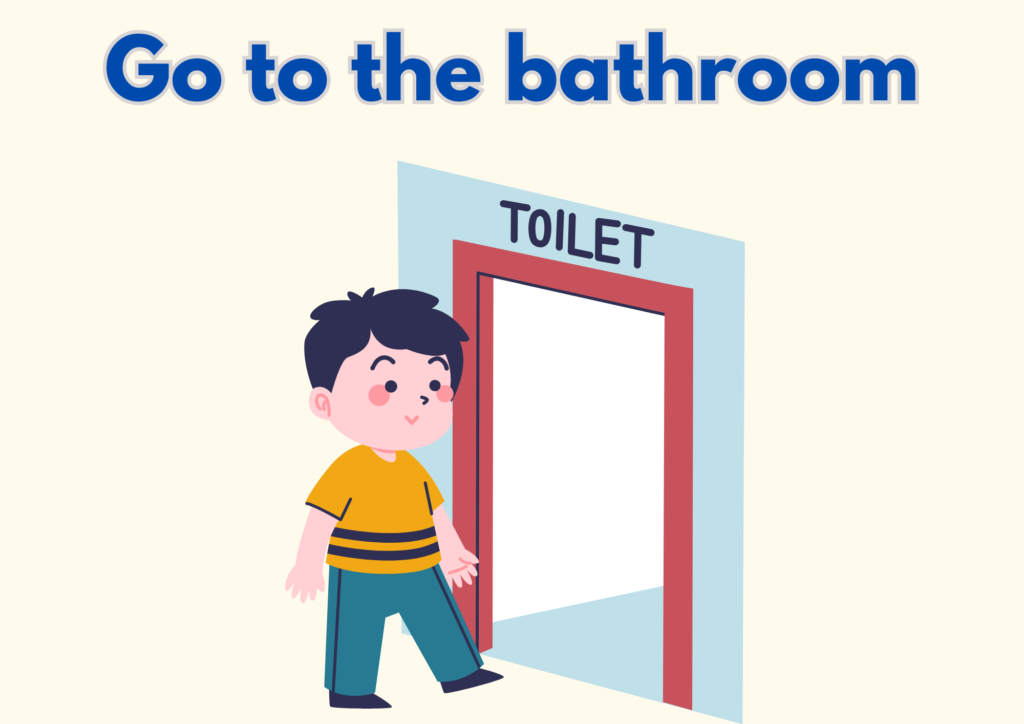
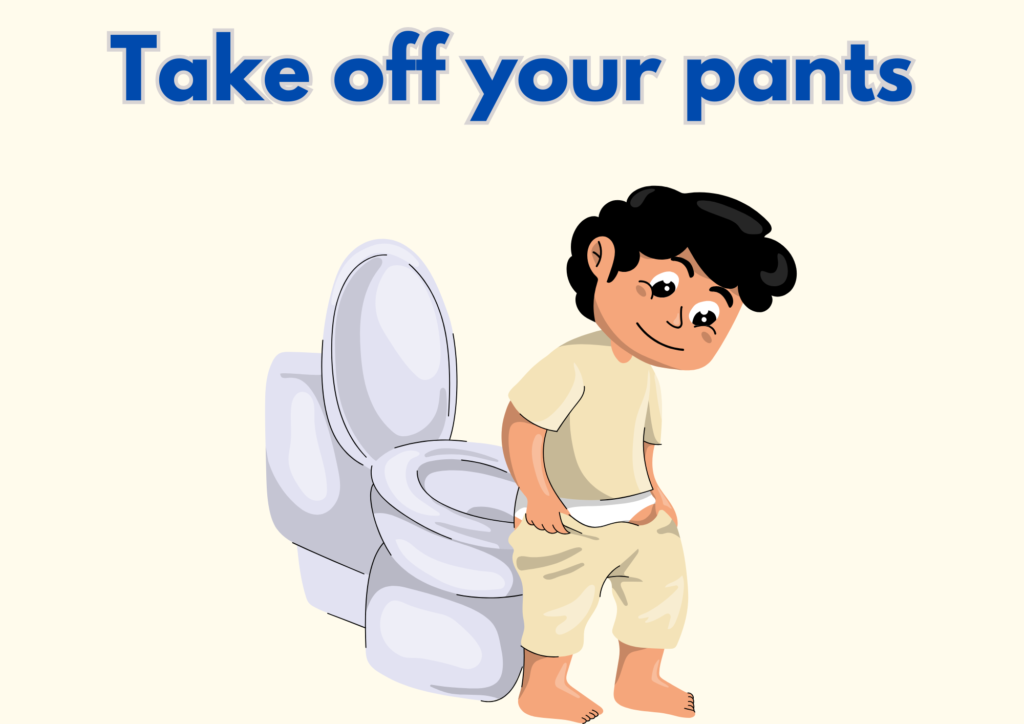
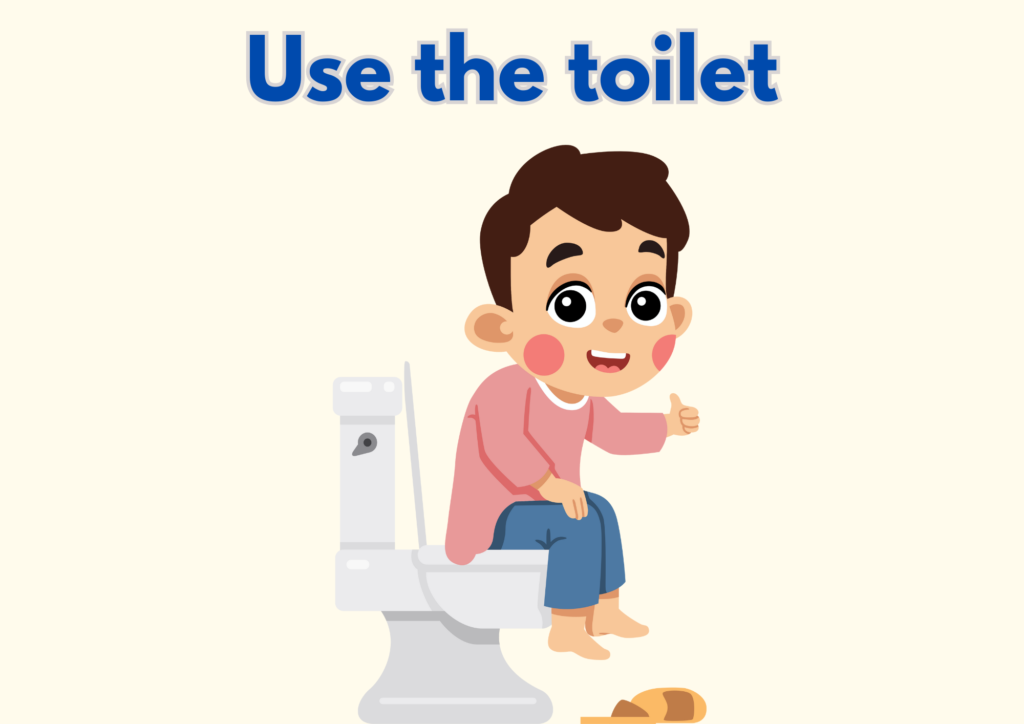
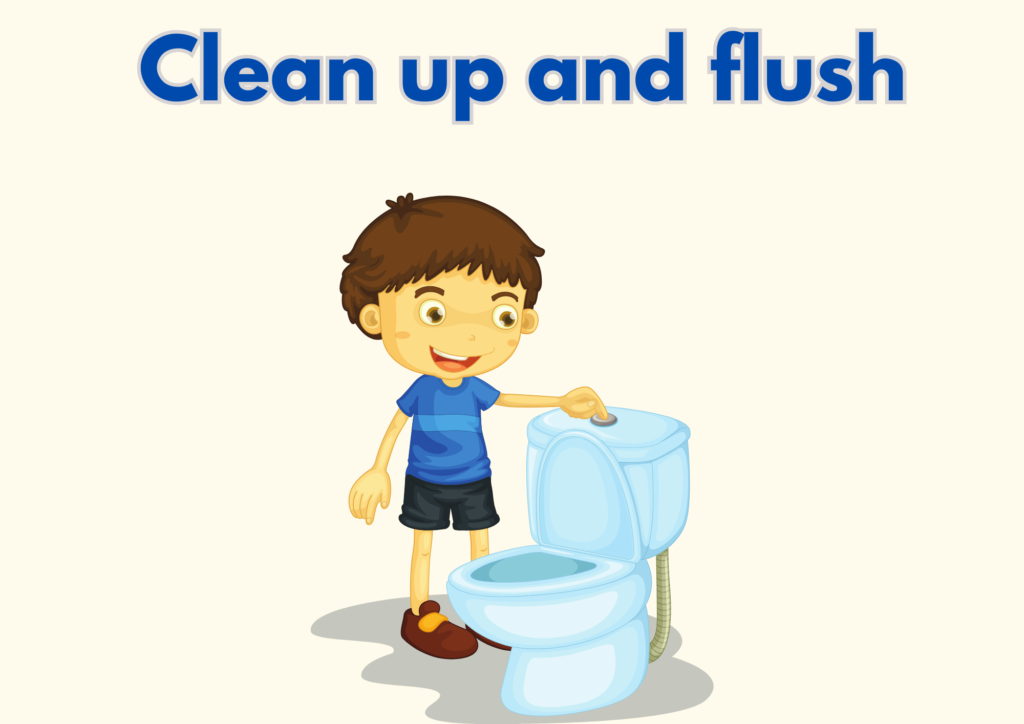
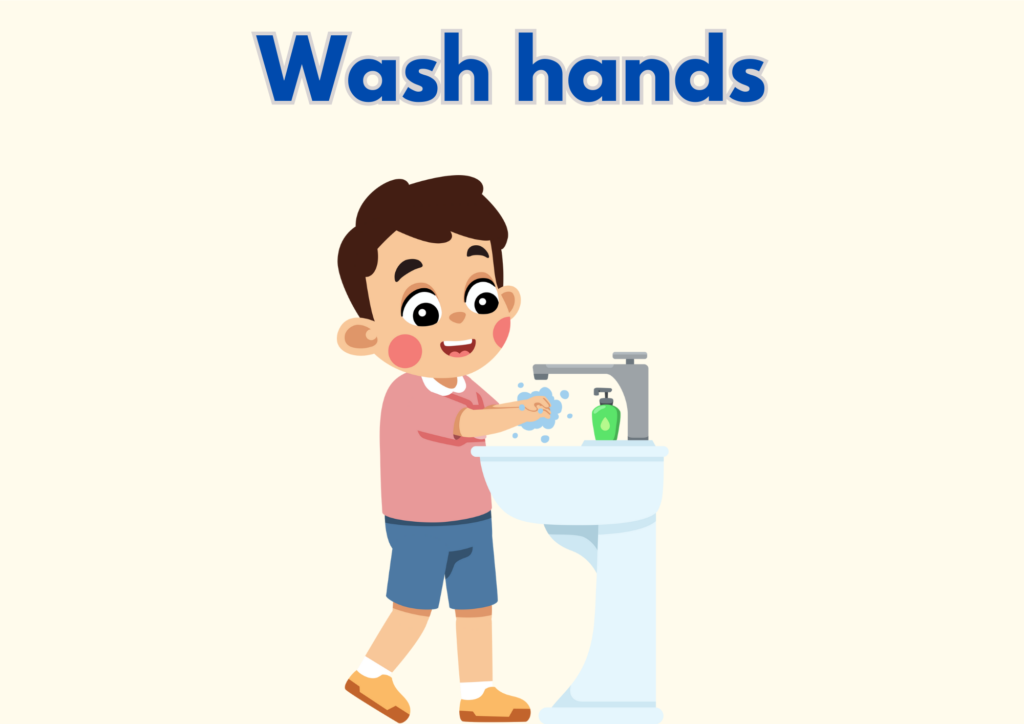
1. Go to the bathroom.
2. Take off your pants.
3. Use the toilet.
4. Clean up and flush.
5. Wash hands.
Show the flashcards daily and explain each step visually.
9. Using Sibling Role Models
- If the child has younger siblings, show how they use the toilet and encourage them with positive words.
10. Eliminating Diapers
- Stop using nappies or diapers to avoid developing dependency.
- Maintain a positive mindset and work consistently with your child.
- Autistic children can be rigid with routines, and toileting in diapers may make training more challenging. However, with patience, positive reinforcement, and consistency, toilet training becomes manageable.
My Experience with my Son: Potty Training Autistic Child
My son is 5 years old and has moderate autism. He became toilet-trained at age 4 years in the beginning of January 2024. I was very stressed when he couldn’t go to the toilet independently. Whenever I felt he needed to use the toilet, I would take him to the bathroom, sit him on the toilet, and demonstrate the process in front of him. I repeated this, six times a day because my son had significant gastric issues.
One day, while I was working in the kitchen, I heard a noise from the bathroom. When I checked, I saw my son sitting on the toilet and using it by himself! After that, I kept encouraging him every time he tried to do it on his own. With consistent encouragement, my son became toilet trained.
I hope my experience helps you!
Conclusion : Potty Training Autistic Child
Some parents worry that their child has turned 3 or 4 years old or even older without being potty trained, which can be stressful. Potty training is not just a simple skill—it depends on the child’s sensory issues and behavioral challenges. This is why some children learn quickly while others need more time and patience.
With consistent practice and by understanding the specific needs of your child, potty training can become much easier. Each child is different, and with love and patience, parents can successfully help their children achieve this important milestone.
Frequently Asked Questions (FAQs)
Why do autistic kids potty train late?
Autistic children often face challenges with potty training due to sensory sensitivities, behavioral challenges, and difficulties in understanding. They may not always grasp what we are trying to teach them, making the process slower. However, with consistent practice and the use of visual aids, they can better understand what is being communicated. Daily practice and patience can help them eventually become toilet-trained.
At what age should an autistic child be potty trained?
The age at which autistic children become toilet trained can vary. Every child’s autism journey is unique, and their developmental pace differs. Generally, autistic children take longer to become toilet trained due to sensory sensitivities, communication challenges, and behavioral issues. While many autistic children are toilet trained by ages 3-4, some may take until age 5 or 6, depending on signs of readiness and the consistency of the parents.
Why do autistic kids play with Poop?
Autistic children play with poop because they have sensory sensitivities, communication difficulties, or behavioral patterns. Some children find the texture or smell of feces interesting, which may be part of their sensory exploration. If children are unable to express their needs properly, they may act out to get attention through such behavior. Some children have poor social skills or awareness, so playing with poop does not seem wrong to them. Stress or anxiety may also be a cause of the behavior.
